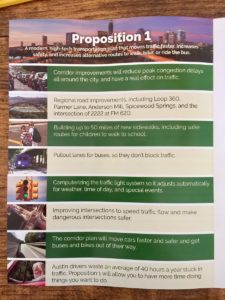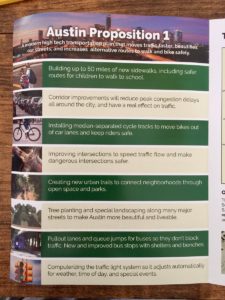Vote in the Republican primary? Here’s what’s for you in the mayor’s transportation bond
Wednesday, October 5, 2016 by
Audrey McGlinchy, KUT In East Austin, a case of poorly delivered mail has led to a political strategy revelation, of sorts. It involves Mayor Steve Adler’s $720 million transportation bond and one-half of a local political action committee that attempted to recall City Council Member Ann Kitchen earlier this year – a recipe for greatness.
“I tend to get a lot of my neighbor’s mail,” said Tori Moreland in her office on Congress Avenue. Recently, she picked up her mail and noticed two advertisements from the pro-bond PAC Move Austin Forward.
One mailer placed more emphasis on the bond money that would be spent on sidewalks and urban trails. That mailer was addressed to her neighbor. The other, addressed to Moreland, focused on the bond’s benefits for drivers.
“He and I have discussed politics in great length before,” said Moreland. She tends to vote conservative, while her neighbor is more liberal. Their voter histories, reasoned Moreland, must have determined which mailer they received.
“For my mail piece, I guess what you could consider the more conservative or Republican – or Libertarian even – leaning piece, it says, ‘Pullout lanes for buses, so they don’t block traffic,’” said Moreland. “Whereas, in the other mail piece, it goes on to say, ‘New and improved bus stops with shelters and benches.’”
It’s basic campaign strategy, said local political consultant Mark Littlefield.
“You might emphasize different things to different voters,” he said. And that’s exactly what the pro-bond campaign is doing.
A consultant for the pro-bond campaign, David Butts, said the polling they’ve done sought to weed out how conservatives and liberals think about getting around. “Republicans represent a certain philosophy,” said Butts. “They’re more inclined to see roads and cars as being something that’s absolutely necessary and something we should be trying to accommodate.”
That notion seems to play out on a national level. In 2014, the Pew Research Center conducted a study about party polarization and lifestyles. Researchers found that 75 percent of consistently conservative voters prefer to live in communities with large homes spaced farther apart from one another. Meanwhile, among those who consistently vote liberal, 77 percent of them said they prefer to live in a more walkable, urban community.

When targeting messages based on these party-affiliated behaviors, the pro-bond campaign has overlooked very little. Examine the mailers further, and the targeting can be seen in even the photo choices. The more conservative-leaning mailer features a picture of the Loop 360 bridge, which “is really sort of more tied into the western side of the city, which is where most conservative or Republican-leaning voters live,” said Butts.
The more sidewalk- and bike-oriented mailer features a photo of downtown Austin, suggesting the notion of “the central city, the downtown, as sort of the identity of the city as a whole,” said Butts.

Move Austin Forward spokesman Jim Wick, on leave from his job in the mayor’s office, emphasized that the problem the bond claims to solve is nonpartisan. “It really doesn’t matter if you’re a Democrat or a Republican when you’re sitting in traffic,” said Wick. “It’s all the same.”
He also said that the campaign is relying not just on voter history but also on age, geography and ethnicity.
Nonetheless, Moreland is pretty sure her voter history is what got her the more conservative mailer. (Moreland lives in East Austin, which leans left. She is also under 30, another demographic that tends to vote Democrat.)
“I find it interesting that they did focus my mailer more on car traffic,” said Moreland, who rides her bike to and from after-work spots and on the weekend. “I’m pretty multimodal.”
Photos courtesy of Tori Moreland. This story was produced as part of the Austin Monitor’s reporting partnership with KUT.
The Monitor’s work is made possible by donations from the community. Though our reporting covers donors from time to time, we are careful to keep business and editorial efforts separate while maintaining transparency. A complete list of donors is available here, and our code of ethics is explained here.
You're a community leader
And we’re honored you look to us for serious, in-depth news. You know a strong community needs local and dedicated watchdog reporting. We’re here for you and that won’t change. Now will you take the powerful next step and support our nonprofit news organization?





